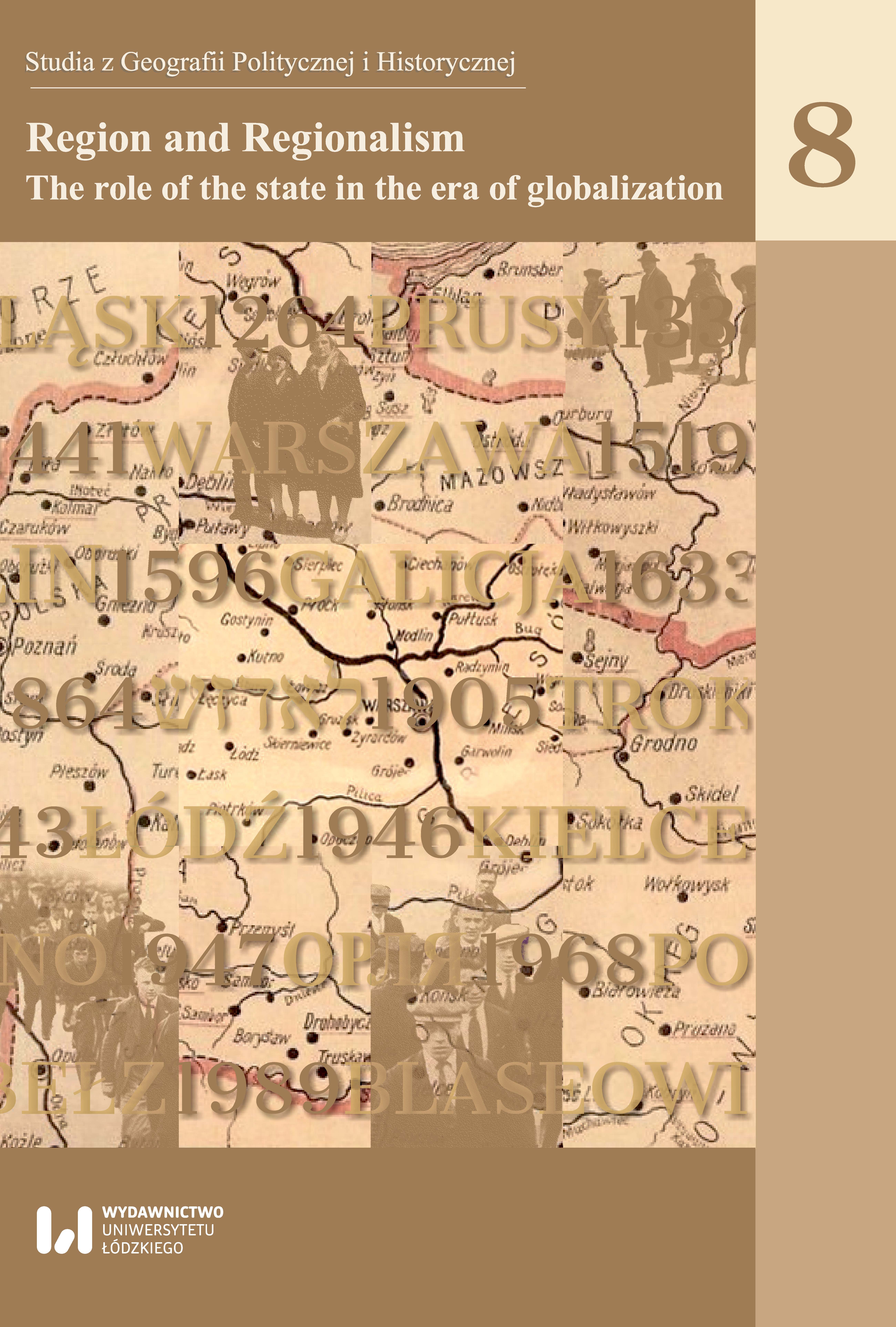Sikhowie – religia i naród. Wybrane polityczne i społeczne uwarunkowania funkcjonowania
DOI:
https://doi.org/10.18778/2300-0562.08.09Słowa kluczowe:
Sikhizm, Indie, Pakistan, Pendżab, pogranicze, wielokulturowośćAbstrakt
W artykule podjęto próbę oszacowania wpływu warunków geograficznych i politycznych na transformację społeczności Sikhów po dekolonizacji Indii w 1947 roku. Autorzy wykorzystali, między innymi, wyniki własnych badań terenowych, analiz statystycznych i opracowań naukowych.
Głównym celem artykułu jest wyjaśnienie specyfiki funkcjonowania Sikhów, którzy pomimo wyjątkowo niesprzyjających warunków geopolitycznych i stosunkowo niewielkiej populacji byli w stanie utrzymać własną tożsamość i osiągnąć poziom rozwoju społeczno-gospodarczego wyższy niż średnia dla Indii i Pakistanu. Współcześni Sikhowie są często postrzegani zarówno jako wspólnota religijna, jak i narodowa. Zasadniczo ich głównymi cechami są wyraźne różnice kulturowe i moralne oraz bardzo silna świadomość ich tożsamości. Przejawiają silną więź ze swoim regionem. Sikhowie odgrywają kluczową rolę w społecznym, politycznym, a zwłaszcza gospodarczym i wojskowym funkcjonowaniu państwa. Z powodu koncentracji na pograniczu indyjsko-pakistańskim, silnej militaryzacji i tendencji separatystycznych Sikhowie odgrywają kluczową rolę w polityce wewnętrznej i zagranicznej Indii.
Bibliografia
Banerjee A.C., 1983, The Sikh Gurus and the Sikh Religion, Munshiram Manoharlal Publishers, New Delhi.
Google Scholar
Boyce G.D., 1999, Decolonisation and the British Empire 1775–1997, MacMillan Press LTD, London.
Google Scholar
DOI: https://doi.org/10.1007/978-1-349-27755-1
Brekke T., 2014, Sikh tradition, [in:] Reichberg G., Syse H. (eds.), Religion, War and Ethics. A Sourcebook of Textual Traditions, Cambridge University Press, New York: 672–700.
Google Scholar
DOI: https://doi.org/10.1017/CBO9780511979651.013
Bryjak G.J., 1985, The economics of assassination: The Punjab crisis and the death of Indira Gandhi, “Asian Affairs”, 12 (1): 25–39.
Google Scholar
DOI: https://doi.org/10.1080/00927678.1985.10553675
Ghuman R.S., 2012, The Sikh Community in Indian Punjab: Some Socio-Economic Challenges, “Journal of Punjab Studies”, 19 (1): 87–109.
Google Scholar
Harsimranjeet K., 2010, Nationalist historians on Sikh history, Punjabi University, Patiala.
Google Scholar
Iyer S., 2002, Demography and Religion in India, Oxford University Press, New Delhi.
Google Scholar
Jaswinder S., 2011, Religious and historical paradigms of the Sikh identity, Punjabi University, Patiala.
Google Scholar
Kalkat G.S., 2017, Punjab agriculture-trends and technology, “Agricultural Research Journal”, 54 (2): 283–286.
Google Scholar
DOI: https://doi.org/10.5958/2395-146X.2017.00054.0
Kalsi S.S., 2005, Religions of the World. Sikhism, Chelsea House Publishers, Philadelphia.
Google Scholar
Kaur U.J., 1990, Sikh Religion and Economic Development, National Book Organization, New Delhi.
Google Scholar
Leaf M.J., 1985, The Punjab crisis, “Asian Survey”, 25 (5): 475–498.
Google Scholar
DOI: https://doi.org/10.2307/2644402
Lutz J., 2017, Risk Sensitivity and the Sikh Uprising in the Punjab, “India Quarterly: A Journal of International Affairs”, 73 (3): 327–341.
Google Scholar
DOI: https://doi.org/10.1177/0974928417716213
Macauliffe M.A., 1909, The Sikh religions, The Clarendon Press, Oxford.
Google Scholar
Mehar S.G., 2017, Demographic Dynamism of Punjab, 1971–2011, “Economic and Political Weekly”, 52 (3): 26–29.
Google Scholar
Moore R.J., 1982, Decolonisation in India, “The Journal of Commonwealth & Comparative Politics”, 20 (2): 189–199.
Google Scholar
DOI: https://doi.org/10.1080/14662048208447407
Nesbitt E., 2005, Sikhism. A very short introduction, Oxford University Press, Oxford.
Google Scholar
DOI: https://doi.org/10.1093/actrade/9780192806017.003.0001
Office of the Registrar General & Census Commissioner, India, 2011 Census Data, http://www.censusindia.gov.in 15.12.2016.
Google Scholar
Owen C., Sambhi P.S., 1987, Sikhowie. Wiara i życie, Wydawnictwo Łódzkie, Łódź.
Google Scholar
Owen C., Sambhi P.S., 2005, A popular dictionary of Sikhism, Taylor & Francis Group, London–New York.
Google Scholar
Paroha U., 1993, Terrorism in Punjab: Origins and dimensions, “Indian Journal of Political Science”, 54 (2): 238–250.
Google Scholar
Sandhu A.H., 2012, Sikh Failure on the Partition of Punjab in 1947, “Journal of Punjab Studies”, 19 (2): 215–232.
Google Scholar
Singh Ch., 2016, Religion and Economic Growth: Elements from Sikhism, Indian Institute of Management, Bangalore.
Google Scholar
DOI: https://doi.org/10.2139/ssrn.2763585
Sumail S.S., 2007, Contesting vision of Sikh identity in Punjab: 1800–1930, Jawaharlal Nehru University, New Delhi.
Google Scholar
The Sikh Encyclopedia. Population, https://www.thesikhencyclopedia.com/the-modern-history-of-sikhs-1947present/population 15.12.2016.
Google Scholar
Pobrania
Opublikowane
Jak cytować
Numer
Dział
Licencja

Utwór dostępny jest na licencji Creative Commons Uznanie autorstwa – Użycie niekomercyjne – Bez utworów zależnych 4.0 Międzynarodowe.








